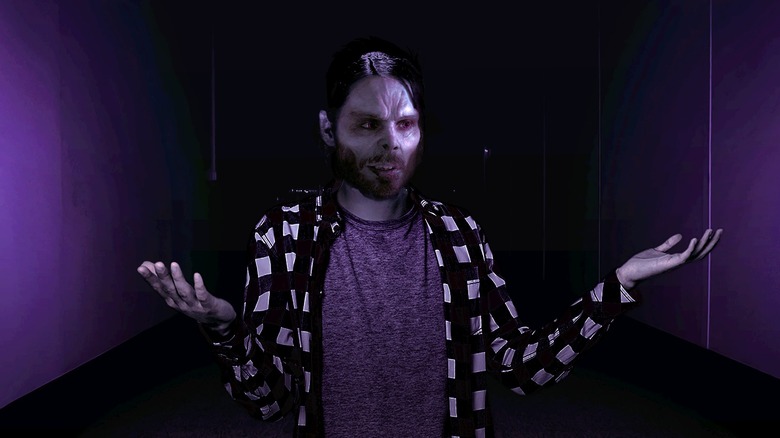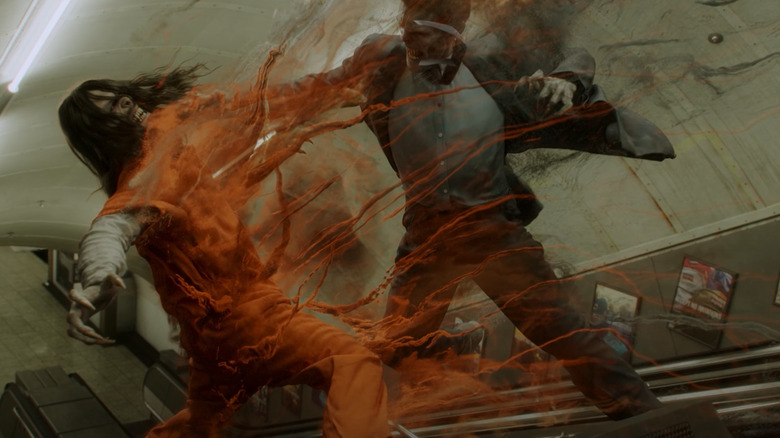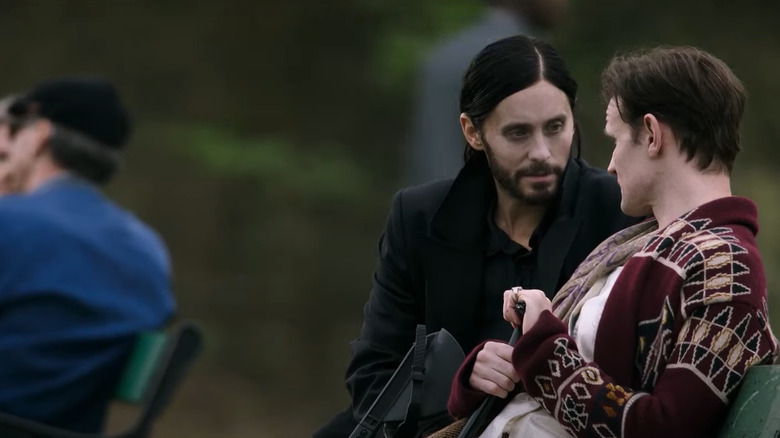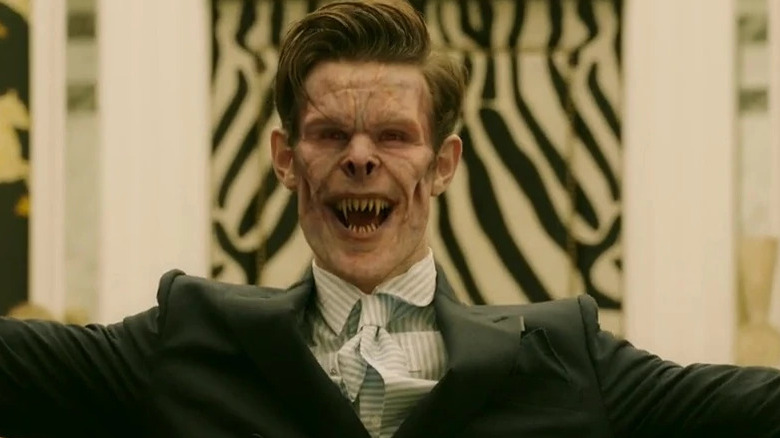Morbius Was Just One Romance Shy Of A Watchable Movie
Morbius should've been gay. That's where this is going. No point in burying the lede. And it would've saved the film.
Few motion pictures have fish-hooked the fleshy, sensitive imaginations of the public zeitgeist with quite the same uninspiring financial returns as "Morbius," the Sony flick that had audience members saying, "Oh, so this is what it's like to have a whole movie theater all to myself." Like "Snakes on a Plane" before it and just plain "Plane" shortly after, the sordid tale of Nobel Prize-winning exsanguination antihero Doctor Michael Morbius managed to thread a pop culture needle in a rare, astonishing way, capturing our collective interest enough to get us talking, but failing to convince us to try and find parking close to an AMC. Then came the brutal reviews in a tidal wave of stunned confusion, unfettered annoyance, and perhaps most of all, boredom.
Adding to the tragedy is the fact that, if you squint hard enough, you can see the pieces that might have come together to make "Morbius" a better story. Yes, believe it or not, there are quality components here. The film came courtesy of "Life" director Daniel Espinosa, and was written by ... well it was written by the guys that made "Dracula Untold." Skip that part, forget we said anything, and be happy that at least they didn't actually squeeze Morbius' fake catchphrase in here. Instead, let's focus on Jared Leto, who (say what you will about him) has given strong performances, and Matt Smith, who's one lunch away from being one of Hollywood's most in-demand actors. Given the chance, the two could've built one of mainstream superhero movies' first genuinely compelling romances.
The glaringly obvious queer subtext of Morbius
The X-Men, Spider-Man, and most of Marvel's star players have always been a stand-in for the targets of societal biases. They're not shy about it, either, and for receipts, check the deeply unsubtle "Have you tried not being a mutant?" scene from 2003's "X2: X-Men United." Give any nerd a glass of scotch and an inquisitive look and we'll enthusiastically explain that under the surface of every well-known superhero or villain, there's at least one subtlety-free metaphor glaring so brightly that you have to wear special glasses to look at it. That's literally why we all wear glasses (well, that, and because a lot of us stared at eclipses after "Heroes" implied that it would give us superpowers).
What's wild is how close "Morbius" veers toward tapping into that sweet social commentary in his big screen debut, even if unintentionally. Consider where the story starts out — with two young men separated from society because of something inside them that makes them different. From the beginning, one of them has become so jaded by years of isolation that he doesn't even learn his new roommate's name, preferring to treat him as an expendable entry in a long list of temporary acquaintances (you know, the whole "Milo" thing). Through shared trauma and a desperate desire for acceptance, the two bond, forming an irreplaceable connection.
Look, buy it or don't buy it, but a Morbius and Milo romance (shall we say Milorbius? C'mon, let's do it) makes about a thousand percent more narrative sense than whatever was going on with Doctor Bancroft, a character you almost definitely had to Google just now to be sure you were thinking of the right person.
The senseless comradery of Milo and Michael would've instead been an epic romance
"Dear Milo," a young Michael Morbius writes to his bunkmate on his way out the door. "This isn't goodbye. I'm going to find a cure for us so we can be cranky old men someday." As if the promise of growing old together wasn't romantic enough, Milo winds up dropping his letter from Michael out of a window thanks to one of those specific strong breezes that only pick up when someone in a movie is holding a note that they don't want to lose. Outside, a group of cartoonishly over-the-top bullies read the correspondence and laugh and laugh and laugh, leading Milo to first request that the letter be returned, then attack the bullies in an attempt to get it back, then get his ribs kicked in as a result.
On paper, it is something close to impossible to read this scene as anything less than romantic, and it's a theme that continues throughout the movie just about every time that Michael and Milo share a scene. They walk down the street together, Milo asking semi-bitterly about the woman Michael has been spending time with and reminding him not to fall in love. They sit on a park bench together, reassuring one another that they'll always have each other. "We're the original Spartans," they say. Even Milo's death scene is a moment of heartbreaking intimacy. The part towards the end, not the bit where a million bats attack him.
Look, bury your head in the sand if you want, but these two only make sense as friends in a world where no two men have ever fallen in love. Which, come to think of it, might actually be what the Sony corner of the MCU multiverse hinges on, based on the way we're supposed to believe that Venom and Eddie Brock aren't supposed to be an old married couple.
Instead, Morbius opted to be as generic (and boring) as possible
At the end of the day, no single tweak was going to entirely fix the mess that was "Morbius." The special effects were, at times, two degrees better than a Snapchat filter. The story felt like it was assembled in the twilight of a moderate concussion. The post-credit sequence had all the narrative lucidity of the preamble to a five-year-old's action figure fight. The movie was a cinematic grease fire that the studio kept pouring water on top of and not understanding why it wouldn't get better.
But even a lazy movie can pull in an audience if it keeps an emotional core, and it's frustrating to think about how close "Morbius" came to having one. It could have been a story about a connection forged in loneliness, the comfort that comes from a shared sense of seclusion, and the pain that comes with loving someone and then losing them, romantically, philosophically, and inevitably, through the permanence of death. It's strange to consider, but "Morbius" could have been not just Marvel's first unflinching same-sex romance, but one of their first genuinely captivating love stories, period.
Anyway, at least we got Matt Smith doing a little vampire dance. Small victories.



